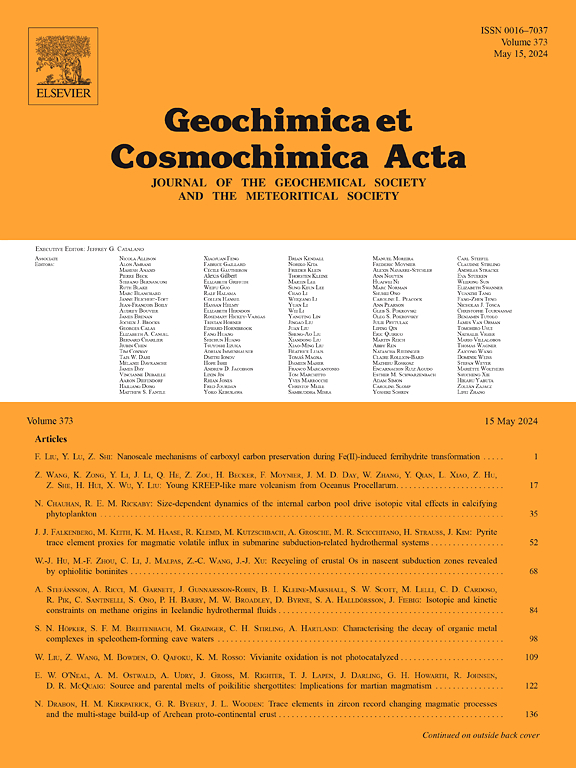小行星水蚀作用下氨基酸的演变
IF 4.5
1区 地球科学
Q1 GEOCHEMISTRY & GEOPHYSICS
引用次数: 0
摘要
碳质软岩含有氨基酸,在碳质软岩之间和碳质软岩内部,氨基酸的丰度和同位素组成各不相同。母体过程和粘土矿物的存在可能是造成这些差异的原因。在这里,我们通过实验研究了6种氨基酸(甘氨酸、β-丙氨酸、α-丙氨酸、2-氨基异丁酸、γ-氨基丁酸和异戊酸)在存在或不存在硅酸盐的热液条件下的演变过程。我们使用 X 射线衍射、光谱和质谱方法测定了残留物可溶部分和固体部分有机化合物的化学性质和同位素组成。甘氨酸和α-丙氨酸表现出相当高的稳定性,这与在经历过不同程度水蚀变的软玉中测量到的α-丙氨酸和甘氨酸的丰度是一致的。与此同时,β-丙氨酸在热液条件下的演化导致了一种新化合物的形成,这种新化合物很可能是由β-丙氨酸脱羧和脱氨基后重组而成的。在水变化过程中,95% 以上的 γ-ABA 通过自我环化转化为 2-吡咯烷酮。在有粘土矿物存在的情况下进行的实验的固体残留物含有有机物质,其丰度随实验所用氨基酸的不同而变化(TOC 异戊酸;2-氨基异丁酸;γ-氨基丁酸;甘氨酸;α-丙氨酸)。因此,粘土矿物更倾向于捕获支链氨基酸,而不是链状氨基酸,这很可能与 XRD 数据所表明的那样,是在它们的层间空隙中。在实验过程中,即使存在硅酸盐,氨基酸的 δ13C 值也没有发生显著变化。因此,报告的 CR 和 CM 软骨中氨基酸的 δ13C 值很可能与合成条件或其前体的来源有关(即继承自生成前的过程)。本文章由计算机程序翻译,如有差异,请以英文原文为准。
The evolution of amino acids under asteroidal aqueous alteration
Carbonaceous chondrites contain amino acids, with variable abundances and isotope compositions between and within carbonaceous chondrites. The parent body processes, and the presence of clay minerals may explain those differences. Here, we experimentally investigate the evolution of 6 amino acids (glycine, β-alanine, α-alanine, 2-aminoisobutyric acid, γ-aminobutyric acid, and isovaline) exposed to hydrothermal conditions in the presence or absence of silicates. We determined the chemical nature and isotopic composition of the organic compounds of the soluble and solid fractions of the residues using X-ray diffraction, spectroscopy, and mass-spectrometry methods. Glycine and α-alanine exhibit a rather high stability, which is consistent with the measured abundances of α-alanine and glycine in chondrites having experienced various degrees of aqueous alteration. In the meantime, the evolution of β-alanine under hydrothermal conditions leads to the formation of a new compound, which likely results from the decarboxylation and deamination of β-alanine followed by recombination. More than 95 % of γ-ABA was transformed into 2-pyrrolidione though self-cyclization during the aqueous alteration. The solid residues of the experiments conducted in the presence of clay minerals contain organic material, with abundances varying depending on the amino acid used for the experiments (TOC isovaline > 2-aminoisobutyric acid > γ-aminobutyric acid > glycine > α-alanine > β-alanine). Clay minerals thus preferentially trap branched amino acids over chained amino acids, likely within their interlayer spaces as suggested by XRD data. The δ13 C values of amino acids have not changed significantly during the experiments, even with the presence of silicates. Thus, the δ13 C values of amino acids reported in CR and CM chondrites likely relate to synthetic conditions or the origin of their precursors (i.e. inherited from the pre-accretion processes).
求助全文
通过发布文献求助,成功后即可免费获取论文全文。
去求助
来源期刊

Geochimica et Cosmochimica Acta
地学-地球化学与地球物理
CiteScore
9.60
自引率
14.00%
发文量
437
审稿时长
6 months
期刊介绍:
Geochimica et Cosmochimica Acta publishes research papers in a wide range of subjects in terrestrial geochemistry, meteoritics, and planetary geochemistry. The scope of the journal includes:
1). Physical chemistry of gases, aqueous solutions, glasses, and crystalline solids
2). Igneous and metamorphic petrology
3). Chemical processes in the atmosphere, hydrosphere, biosphere, and lithosphere of the Earth
4). Organic geochemistry
5). Isotope geochemistry
6). Meteoritics and meteorite impacts
7). Lunar science; and
8). Planetary geochemistry.
 求助内容:
求助内容: 应助结果提醒方式:
应助结果提醒方式:


